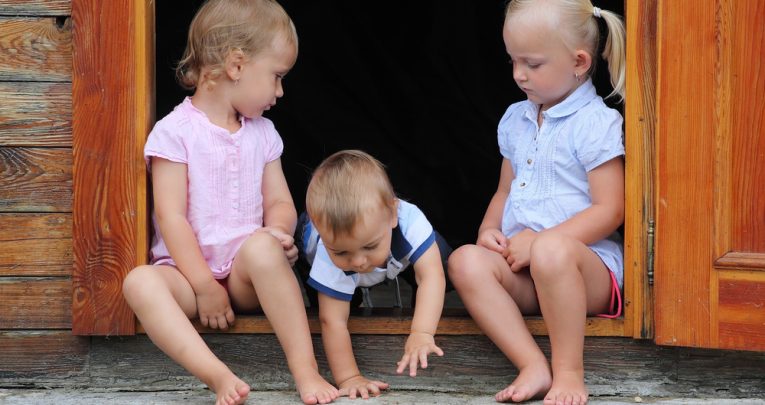Sibling rivalry – How to help children adjust to having a new sibling

Becoming a brother or sister can be a trying time for young children, so parents and practitioners alike must show understanding, says Sarah Ockwell-Smith…

- by Sarah Ockwell-Smith
- Bestselling author and leading expert on gentle parenting Visit website

The birth of a new baby is a happy occasion for everybody… except the new big brother or sister, that is. The arrival sibling can signal a period of difficulty for older children in the family, often translating into a regression in behaviour or new, sometimes violent, undesirable behaviour.
Very often the older sibling is described as ‘being jealous’ – a very negative term to describe the emotional upheaval they are going through. Sometimes the negative behaviour surfaces weeks, or even months after the sibling’s arrival. It is fairly common for parents to say “It can’t be because of the baby, because he’s six months old now.” Yet often the reaction is delayed until the novelty of a new baby in the house wears off, and the older child gets fed up of the baby and wishes things could go back to how they were before.
Big problems
None of these new big brother and sister behaviours are ‘naughty’; they are perfectly normal, and an indication of an unhappy child, desperate for love and attention from their parents (young children often seeing love and attention as the same thing). The worst thing parents can do is to punish the child. This only adds to the disconnect that they feel. Similarly, calling them “a big boy/girl now” just adds to their hurt.
Babies get all of the attention in the house now, big boys and big girls don’t. Being ‘big’ is no longer appealing. To parents, older children can often seem huge when a new tiny baby arrives, but they forget that one, two or even three years is still tiny.
A good way to empathise with what new big brothers and sisters are going through is to place yourself in the following scenario. Imagine you get home from work tonight and your partner is holding hands with a man or woman you have never met before. They say, “Hi, honey. I’d like to introduce you to my new boyfriend/girlfriend. I promise I love you just as much as I ever did. I have enough love for the both of you. In time I think you will also be great friends too.”
Can you imagine your reaction? You haven’t asked for this new person to arrive in your home. How can your partner still love you as much as before if they have a new partner? Are you not enough for them? How might you react? Would you scream, get angry, cry?
If you did, you surely wouldn’t be ‘naughty’; you would be really hurting and confused! This is exactly how children feel when a new baby comes along.
Mum time
It’s very common for fathers to take care of older children when a new baby comes along. Mum will often stay with the baby while dads take the older siblings to nursery or to the park. Mum gets time to relax and bond with the baby in peace, and the older child has all of their needs met by dad. Only they don’t. This is one of the worst things that new families can do.
The older child needs one-to-one time with their mum. Ideally, dad will look after the baby while mum takes the older child to nursery or to the park. If the baby is breast-fed, they can time this to between feeds and leave dad with a bottle of expressed milk for emergencies. The older child really needs some one-to-one time with their mum, to help them to feel that they are loved just as much as before. The more one-to-one time mum can give, the easier they will find the transition.
Parents should also think about any room changes they may make at home in order to accommodate the new baby. Moving the older child out of the parent’s room, or into a toddler bed to vacate their cot, should happen well in advance of the new baby arriving so that they do not feel ‘pushed out’ as a result. The same applies to prams and buggies too.
What can you do?
Childcare workers will often observe unsettled behaviour in new big brothers or sisters. For some, getting one-to-one attention from key workers can be a welcome relief, and they may seek more cuddles and interactions than they did previously. If possible, the best thing you can do is to try to give them the time and attention that they need.
Their behaviour may also be quite difficult. You may notice that they become more violent, or you may see accidents in previously toilet-trained children. Try to stay calm and understand that none of this behaviour is naughty; it’s the normal behaviour of a child who has just had his world turned upside down. Reading books about new babies and focusing on the feelings they may invoke is a great way to help.
Ask how the child thinks the older children in the family are feeling, and explore any issues that come up in more depth. Very often children will project their feelings onto imaginary characters, when they would not tell you how they are feeling themselves.
Trending
For parents, it’s a great help to discuss how their older children are feeling. Once a parent understands that the behaviour is normal and why it occurs, the way they respond is very different. Discussing the aforementioned scenario about imagining your partner has a new boyfriend or girlfriend, is a very powerful way of helping them to empathise with their children.
Finally, be ready to listen. Mothers in particular often don’t have anybody to talk to after the arrival of a second or third child. Midwife and health visitor time is focused much more on first-time mothers; second- and third-timers are generally considered ‘pros’, and you may be the first person who has asked how they are feeling. Don’t underestimate how important your interest and time may be to them.
The issues
Six common behaviours that accompany the arrival of a new baby…
1. Attention-seeking The child may be desperate for the level of attention they had before the baby arrived, due to feeling disconnected from their parents – usually the mother.
2. ‘Baby talk’ The older child may begin speaking like a baby, because babies get all of the attention in the house now. They may ask for a dummy or bottle, or to breastfeed again.
3. Violence It’s common for older children to hit or pinch the new baby, who they see as the cause of their unhappiness.
4. Regression in toileting Withholding and accidents can indicate the older child is feeling a need for more autonomy and security, and is trying to regain some control.
5. Refusal to eat Children cannot control when they get a sibling, but they can control what goes in their mouth and what they swallow – and this gains them attention, too.
6. Sleep problems Frequent night waking may suggest the older child is feeling disconnected from her parents and is seeking love and affection at night, often when the baby is asleep.
Sarah Ockwell-Smith is a parenting expert, author and mother of four; her latest book, Gentle Parenting: How to Raise Calmer Happier Children from Birth to Seven is available now, published by Piatkus.
For more information, visit sarahockwell-smith.com or follow @TheBabyExpert










